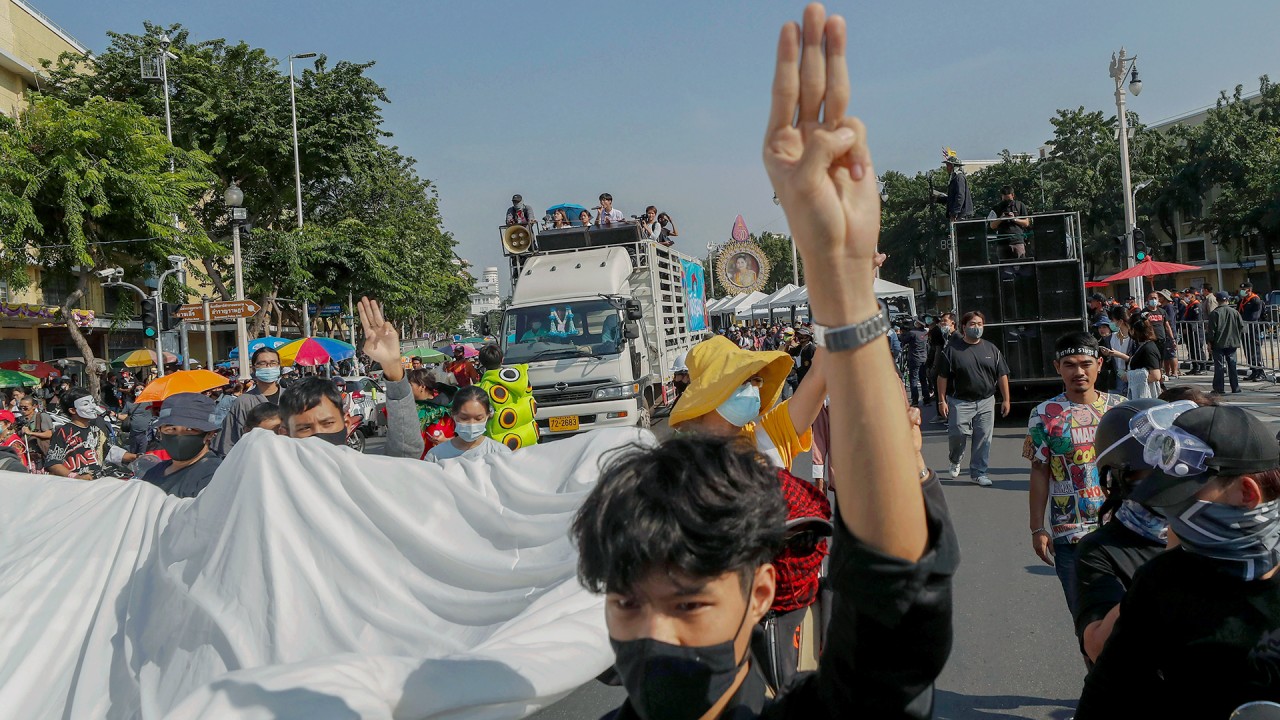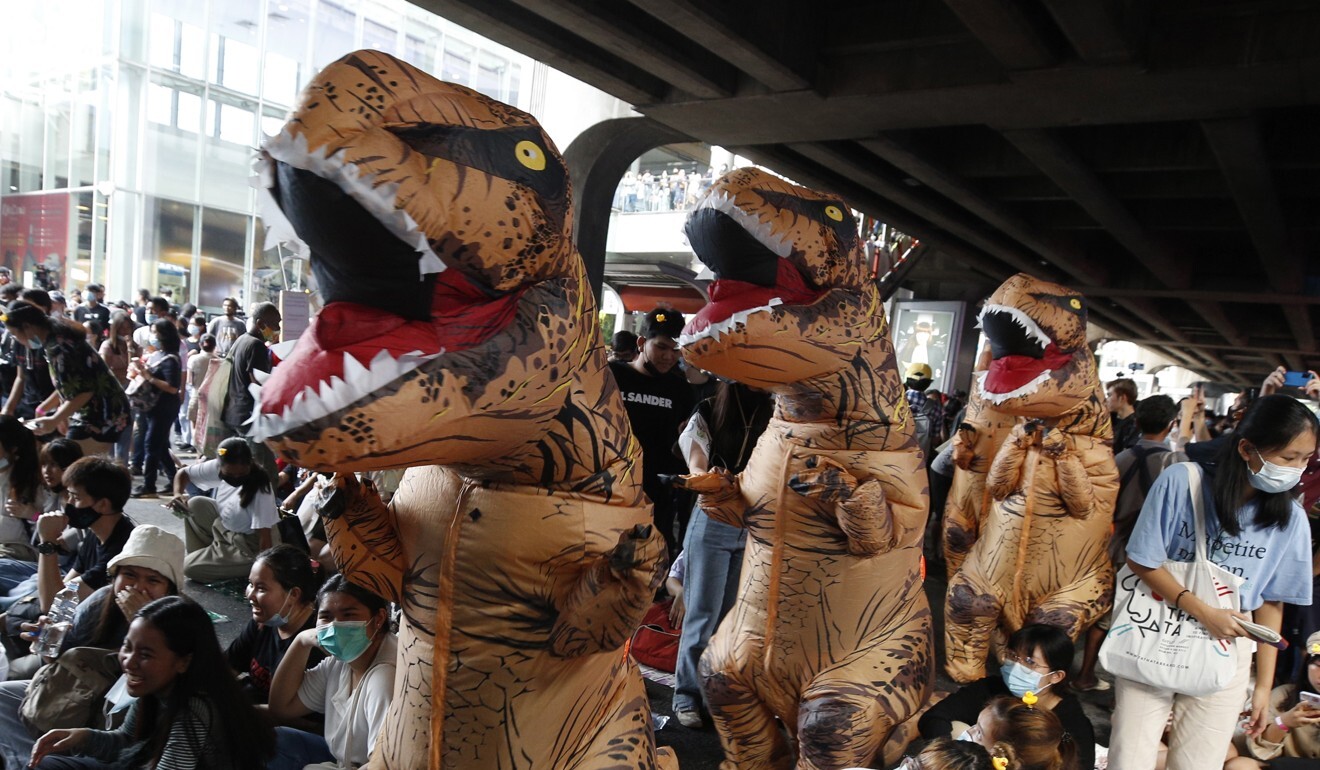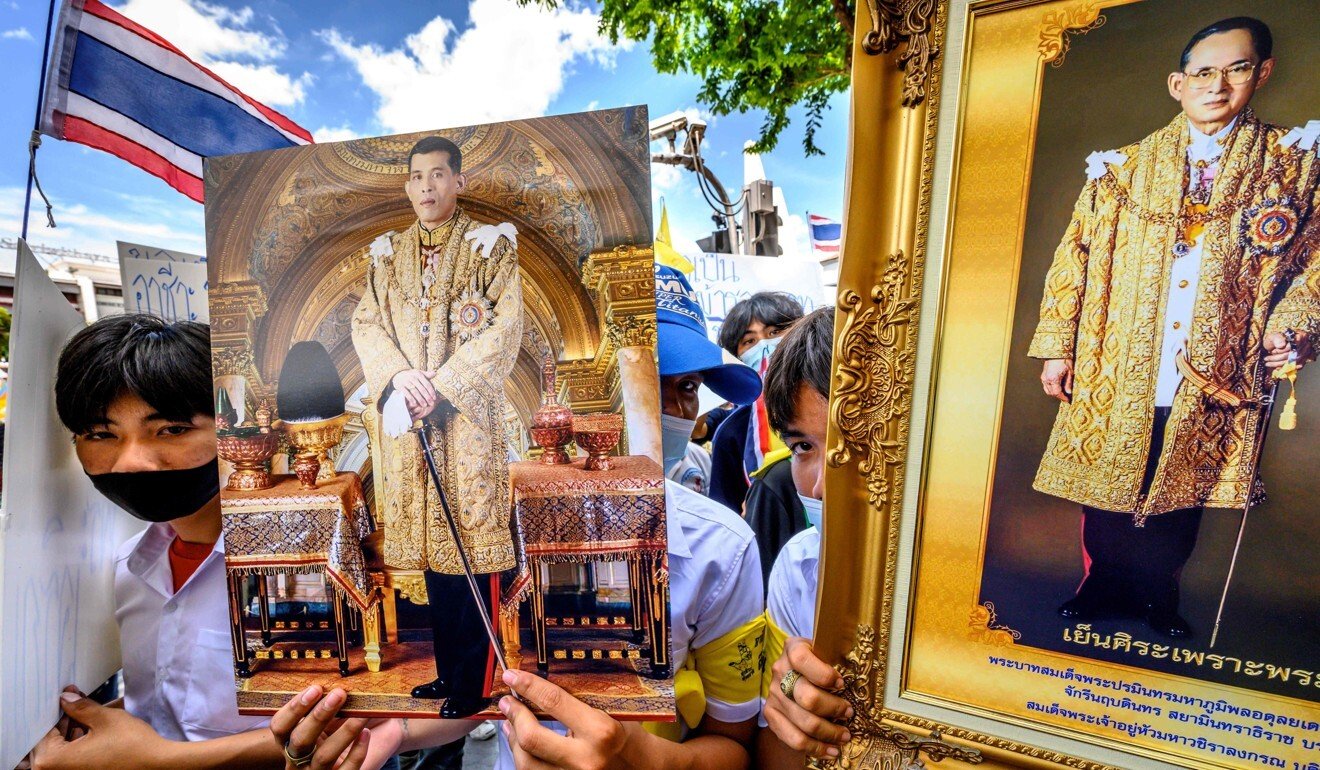
In Thailand, protesters take aim at King Vajiralongkorn’s royal funding machine: the Crown Property Bureau
- Pro-democracy protesters plan to march on Wednesday to demand public oversight of the king’s purse
- Thai police on Tuesday summoned seven leaders of the protests to face charges of lèse-majesté, or insulting the monarchy

02:49
Thai pupils in 'Bad Student' movement demand education reform
Pro-democracy protesters initially planned to march on Wednesday to the office of the Crown Property Bureau, a quasi-governmental institution that manages the king’s wealth, to stage a peaceful and symbolic demonstration. Protesters later changed the location to the Siam Commercial Bank’s headquarters.
Pro-reform movement leader Anon Nampa said the group’s demands include the repeal of the 2018 royal amendment on the crown property act, so as to prevent the monarch spending his wealth at his discretion and to initiate public oversight of the king’s purse.
By doing so, “regardless of how many future kings there will be, the assets of the nation will not be lost”, he said on his Facebook page on Tuesday.
Thai police on Tuesday summoned seven leaders of the protests, including Anon, to face charges of lèse-majesté, or insulting the monarchy, over comments made at demonstrations in September. The charges carry prison terms of up to 15 years, but the protesters have until November 30 to answer the summonses.
One of the seven, Parit “Penguin” Chiwarak, said his family had received a summons on the charges and he was not worried.
“This will expose the brutality of the Thai feudal system to the world,” he said. “We will keep fighting.”
The 2018 legal amendment allowed the king to appoint and remove all board members, where the bureau’s board of directors previously answered to the finance minister.
Other questions related to the public accounting of the king’s spending have also arisen. During the Thai parliament’s fiscal budget debate in September, Bencha Saengchantra, an opposition MP from the Move Forward Party, questioned how the government budget in support of the king’s personal cavalry and helicopter units could overlap with the budget for the armed force branches for the same services.

“We have raised questions about the budget related to the monarchy, but we never really get the clarification we need, even when the country is mired in economic hardship,” she said.
For many Thais, resentment towards the monarchy has been deepened by the country’s economic performance – GDP is expected to contract by more than 7 per cent this year – while millions are forced out of jobs in tourism and manufacturing. Yet the king’s months-long stay at a luxury resort in Bavaria, Germany, during the pandemic has been in the headlines everywhere outside Thailand.
“What makes this particularly egregious is that the king lives lavishly abroad on funds derived from taxes and income generated by Thais,” said Tamara Loos, a professor in Thai and Southeast Asian studies at Cornell University.
“In addition to the funds generated by the Crown Property Bureau, Thais pay for over US$1 billion in costs generated by the monarchy to support the salaries of the staff working in the Royal Household Bureau, plus funds to provide for royal security and royal rural development projects.
“That alone is a major conflict of interest: using public funding to support a repressive monarch who does not appear to have the best interests of his population in mind,” she said.
Loos estimates that the king’s shares in Siam Commercial Bank, Siam Cement Group and other property holdings are worth about US$40 billion, although she added that “the total amount varies between US$30 billion and US$70 billion – the point being that no one really knows because it is not subject to public oversight”.
Siam Commercial Bank and Siam Cement Group were hit hard during the 1997 Asian financial crisis, according to a paper by the late Thai academic Porphant Ouyyanont, but bounced back upon the appointment of the Crown Property Bureau’s director at the time as the chairman of both companies – a move “designed to restore confidence … by linking them directly with the power and prestige of the Bureau”.
“Thanks to the royal ideology that [King Bhumibol] was a frugal man, no one really paid attention to how he accumulated wealth for himself and his family,” said Puangchon Unchanam, a political science lecturer at Naresuan University.

But Forbes magazine’s publication of its richest royals list in the early 2000s, which included the Thai royal family, “changed everything” for Thais, he said.
“Suddenly, some people started to wonder how the Thai king topped the world’s ranking of richest royals,” he said.
“The status of the CPB has become more awkward,” Puangchon said. “On the one hand, it still maintains all the political privileges it has received from the government. On the other hand, it looks more like a private company that is solely owned by the king.”
In effect, Paungchon said, the changes in the management of the Crown Property Bureau effected by the king were a rollback of normal ethics practised by most big businesses.
“It has become more difficult for the public to access the Crown Property Bureau’s annual performance, income, asset, and profit,” he said, since the king put the assets of the bureau under his name. “It looks more like a merchant’s company in the era before the introduction of the stock market than a modern corporation in the age of global capitalism.”
Loos, the Cornell University professor, said protesters’ demands for the reform of the king’s wealth management had a precedent in the era following the end of absolute monarchy in 1932, when the Thai state divided royal property into those properties which belonged to the king and “those deemed state property such as the palaces, and those business units used to finance the institution of the monarchy, which were placed under the Crown Property Bureau” in 1936.
Puangchon said the king’s motive in transferring the Crown Property Bureau’s assets into his own name had parallels to when King Rama VII, in the years before the 1932 revolution, transferred his assets to overseas banks to safeguard them against political instability. “Regardless of how the political situation unfolds under his reign”, he said, the current king “has to own the crown property personally and absolutely”.
This month, King Vajiralongkorn donated royal title deeds worth around 10 billion baht (US$329 million) to four Bangkok educational institutions in a move seen to reduce the pressure on the monarchy.
Ideally, if the king were to relinquish some of his powers and assets, or agree to the protesters’ demands for reform, it would “decrease his wealth and political power, but potentially increase the cultural capital of the monarchy as an institution, which has precipitously declined in terms of popularity and respect”, Loos said.

